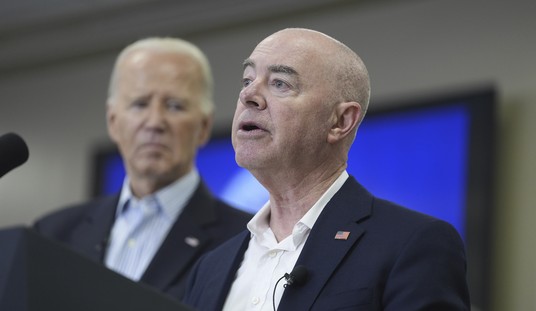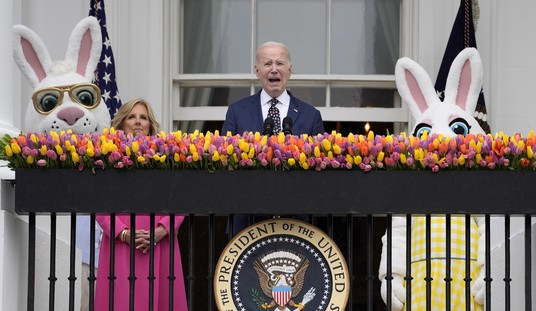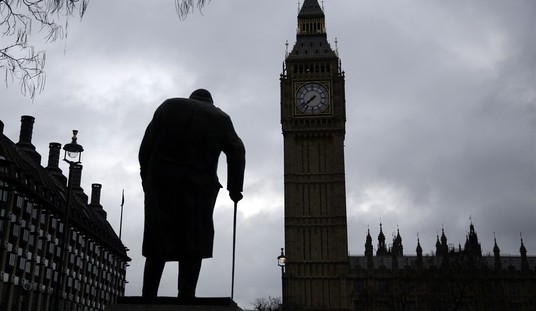The stirring new movie 42 tells the story of how, in 1947 America, Brooklyn Dodgers president Branch Rickey (played by Harrison Ford) broke the unwritten rule about hiring black players and called up Negro League superstar Jackie Robinson (Chadwick Boseman) to join his team. Robinson would go on to win the Rookie of the Year award and later the Most Valuable Player honors on the way to a Hall of Fame career.
What are the conservative lessons about Jackie Robinson’s life to be learned from 42?
1) Merit is colorblind.
Rickey (a lifelong Republican) tells Robinson he is hiring him for one reason: Robinson (who then played for the Kansas City Monarchs of the Negro League) was a baseball phenom and Rickey wants to win the World Series. This is Moneyball before Moneyball: Finding untapped talent others are ignoring. Rickey had in mind not only Robinson but Roy Campanella, the black catcher who would soon follow Robinson into the big leagues, as players who could help him win the Series and make money in the process. Rickey says there’s no black or white in sports, just green. Manager Leo Durocher (Christopher Meloni) tells the team, “I do not care if the guy is yellow or black, or if he has stripes like a zebra. I’m the manager of this team, and I say he plays.
2) There’s no substitute for a strong, loving nuclear family.
Robinson never knew his own father, who left his mother and her five children when Jackie was still a baby. In 42, when he gets the good news that the Brooklyn Dodgers want to give him a shot at being the first black player in the major leagues (in reality, there were some black players in the early days of baseball back in the 1880s), Jackie phones up his girlfriend Rachel (Nicole Beharie) and asks her to marry him right away. Later in the film, Jackie is seen cuddling his newborn son Jackie Jr. and telling him, “I’m going to be with you till the day I die.” Robinson, who along with Rachel raised two other children as well, was as good as his word, remaining a family man until his too-early death at age 53.
3) If you want to get noticed, work hard.
Robinson was a tremendous player for the Kansas City Monarchs and never expected to be a role model for desegregation. But when he gets the opportunity to play for the Dodgers, he vows, “You give me a uniform, you give me a number on my back, and I’ll give you the guts.” In the movie, he’s shown diligently learning two new positions (a former shortstop, he had to learn both second base and first base to play for the Dodgers) to help the team. His work ethic endears him to fellow Dodgers Pee Wee Reese and Ralph Branca, who treat him warmly even as some other players demand to be traded away.
4) Turn the other cheek.
Rickey and Robinson had something big in common besides baseball: They were both devout Methodists. The film somewhat deemphasizes Robinson’s Christianity, though it does feature several scenes in which Rickey uses Biblical references to motivate Robinson, telling him at one point that the player must endure “in the wilderness 40 days.” In reality the bond was equally strong on both sides and Rickey used the Sermon on the Mount to inspire Robinson to forgive his aggressors.
Before hiring Robinson, Rickey worried that the ballplayer had a temper problem. Robinson refused to sit in the back of a military bus during his Army career in WW II, and was court-martialed for it. Rickey warns his new player that he is signing up for a torrent of racist abuse and when Robinson asks in disbelief whether the baseball exec really wants a black player who is afraid to fight back, Rickey tells him, “I want a player who’s got the guts not to fight back. Your enemy will be out in force, and you cannot meet him on his own low ground.” At a Philadelphia Phillies game, the opposing manager harangued Robinson nonstop with racist remarks as the player stood in the batter’s box, but Robinson never retaliated, either verbally or physically.
5) When you get knocked down, don’t whine, get back up.
Robinson (who played first base his rookie year) was spiked in the leg by St. Louis Cardinals star Enos Slaughter and is shown being hit in the head with a pitch, an occupational hazard for any baseball player in the era before mandatory helmets but perhaps a special risk for Robinson. (Though it’s unclear whether this particular incident happened as the film shows.) Robinson doesn’t let such injuries faze him, and he forbids his teammates to avenge him. He simply gets up and resumes playing the game.












Join the conversation as a VIP Member